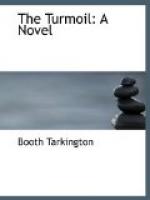Sibyl was a little taken aback. She supposed Mary had remembered something neglected and necessary for the instruction of a servant, and that she would return in a moment; but it was rather a rude excess of absent-mindedness not to have excused herself, especially as her guest was talking. And, Mary’s return being delayed, Sibyl found time to think this unprefaced exit odder and ruder than she had first considered it. There might have been more excuse for it, she thought, had she been speaking of matters less important—offering to do the girl all the kindness in her power, too!
Sibyl yawned and swung her muff impatiently; she examined the sole of her shoe; she decided on a new shape of heel; she made an inventory of the furniture of the room, of the rugs, of the wall-paper and engravings. Then she looked at her watch and frowned; went to a window and stood looking out upon the brown lawn, then came back to the chair she had abandoned, and sat again. There was no sound in the house.
A strange expression began imperceptibly to alter the planes of her face, and slowly she grew as scarlet as Mary—scarlet to the ears. She looked at her watch again—and twenty-five minutes had elapsed since she had looked at it before.
She went into the hall, glanced over her shoulder oddly; then she let herself softly out of the front door, and went across the street to her own house.
Roscoe met her upon the threshold, gloomily. “Saw you from the window,” he explained. “You must find a lot to say to that old lady.”
“What old lady?”
“Mrs. Vertrees. I been waiting for you a long time, and I saw the daughter come out, fifteen minutes ago, and post a letter, and then walk on up the street. Don’t stand out on the porch,” he said, crossly. “Come in here. There’s something it’s come time I’ll have to talk to you about. Come in!”
But as she was moving to obey he glanced across at his father’s house and started. He lifted his hand to shield his eyes from the setting sun, staring fixedly. “Something’s the matter over there,” he muttered, and then, more loudly, as alarm came into his voice, he said, “What’s the matter over there?”
Bibbs dashed out of the gate in an automobile set at its highest speed, and as he saw Roscoe he made a gesture singularly eloquent of calamity, and was lost at once in a cloud of dust down the street. Edith had followed part of the way down the drive, and it could be seen that she was crying bitterly. She lifted both arms to Roscoe, summoning him.
“By George!” gasped Roscoe. “I believe somebody’s dead!”
And he started for the New House at a run.




